
Every day, thousands of people make the decision to take up scuba diving. If you are one of them, congratulations! Diving opens a lifestyle of adventure and new experiences unlike anything in our terrestrial world. You’ll feel weightlessness and interact with marine life of all shapes and sizes. Diving is exciting to be sure, but if you haven’t yet taken the plunge, you probably have questions and might even be a little apprehensive. To help make your transition from land to sea a little more comfortable, let’s explore what it’s like to “get certified.”
Open Water Diver is the introduction certification level that allows divers to dive independently—meaning not under the direct supervision of a qualified, active status diving instructor. Generally speaking, being “certified” means having successfully completed this level of diver training.
Open Water divers are certified to a depth of 60’ in saltwater and in conditions similar to those you were trained in.
You might be surprised to learn there are dozens—maybe hundreds—of certification levels including advanced diving options and countless specialty certifications like wreck diving and underwater photography.
After Open Water, Advanced Diver training is the typical next step. As an Advanced Open Water Diver, you’ll be introduced to more diving experiences including underwater navigation and the opportunity to explore depths to 100 feet.
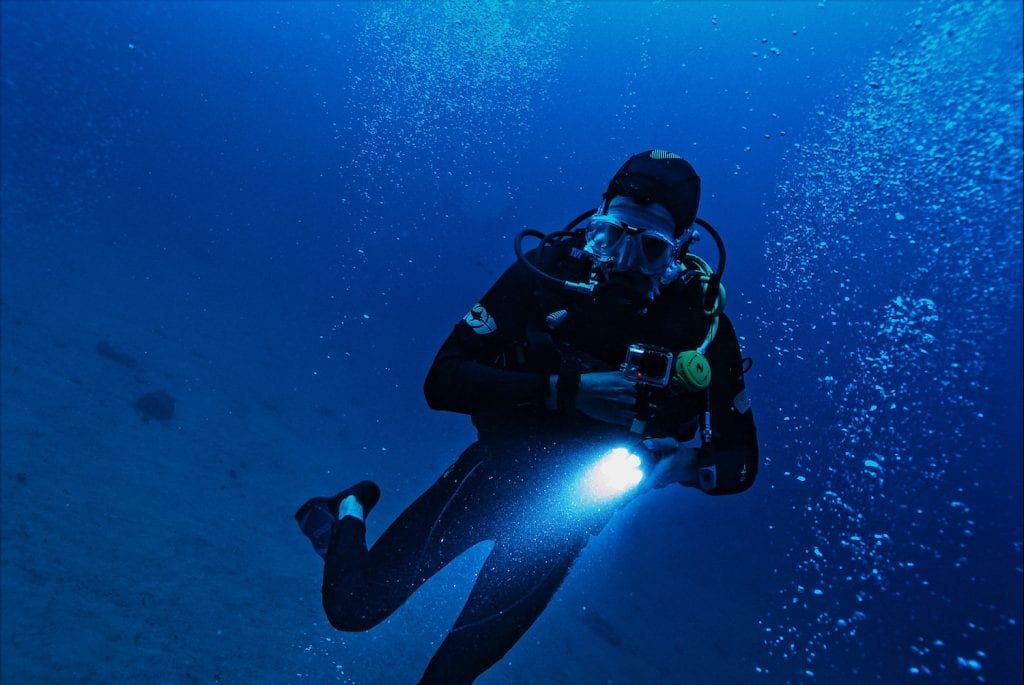
While it is great to learn about future training options, you probably have questions about what your Open Water Diver Course will be like. Common questions among future Open Water Diver students are: Do I have to take my mask off? Do you need to be able to swim to scuba dive? Is it expensive?
Of course, there are countless questions would-be divers ask, but let’s examine these a bit. To begin, mask skills, i.e. removing and replacing your mask are important to scuba diving. A lot of divers fear removing their masks but are surprised to learn it is an easy skill to master.
First off, removing your mask underwater is the same sensation as ordinary swimming without a mask. It’s just water on your face. Something about breathing from a scuba regulator makes it seem more serious, but it really isn’t.
Even the slightest amount of exhalation pressure through your nose will keep you from sucking in water, so water up your nose isn’t a problem after minimal practice. For most divers, it’s never a problem. You can breathe normally without your mask. The weirdest part is that, while SCUBA diving, we only breathe in through our mouth which takes a minute or two to get used to. Once you have that down, clearing and even removing and then swimming without a mask on with the gear is simple.
Clearing your mask simply requires exhaling through your nose while you gradually tilt your head upward. Some masks hold so little water that even the head tilt isn’t necessary. Like most diving skills, you’ll quickly find just the right combination tilt and exhalation volume to clear your mask nearly instantly. Some students don’t believe that adding air to a mask will replace the water inside but it works!
The important message here is, don’t freak out about taking your mask off! It’s no big deal. Promise!
You will need to pass a simple proficiency test, which includes swimming 200 yards freestyle OR 300 yards with your mask, snorkel, and fins. To clarify, “freestyle” in this case means swim that distance pretty much any way you can without the aid of supplemental floatation. In other words, no blow-up ducky or water wings will be allowed.
Some divers choose the mask, snorkel & fins option and just do laps at a manageable pace. The exact number of laps depends on the pool you train in. In any case, it isn’t too much of a challenge for most people. If you set a world record lap time, your instructor won’t be able to verify it to the powers that be, so just go slow!
In addition to the swim, you’ll also be asked to tread water for 10 minutes. The “tread” is another frequent panic point, but seriously, you’ll only be treading water for ten minutes. You’d do it without a second thought if it weren’t a class.
In any case, that’s it for the swimming assessments. Not so hard, right? You don’t need to be able to swim, just snorkel and tread water.
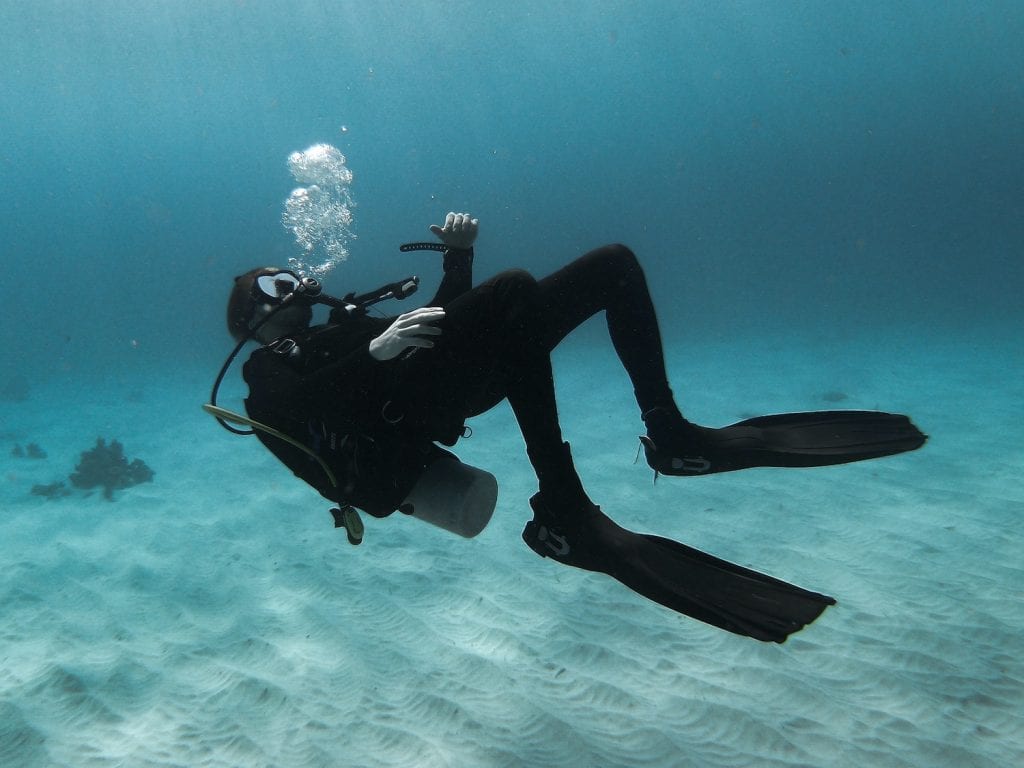
Learning to scuba dive requires access to gear and a minimum level of training (Open Water Scuba Certification). Expensive is a subjective term, but for most who wish to learn to dive, the cost isn’t difficult to manage. Diving equipment can be rented and budget-minded divers often purchase one piece of gear at a time.
In most locations, diving instruction isn’t overly costly. Open Water Scuba Diver is a thorough course that you’ll only take once, so make sure you are comfortable with your instructor. Saving a few pennies in exchange for a miserable experience isn’t worth it.
In most cases, the “resort courses” you find in popular tourist locales are rushed and taught to the maximum ratios of student to instructor. These are typically more expensive than you’ll find where you live as well. If you are planning your first diving vacation, we recommend you learn to dive locally even if you’ll be renting gear onsite. You’ll enjoy better training and spend your days diving rather than in a class.
People new to diving often worry about mask and regulator skills, fixating on the things they fear. Don’t. You’ll find that it just takes a little practice to easily master them.
Diving is a community. You’ll be welcomed into our diving lifestyle with open arms. During your open water course, you’ll likely make lifelong friends and change your own view of the world around you. And you’ll probably never plan a vacation quite the same way.
If you’re still not sure, call us to schedule what some call a “try dive.” Try dive isn’t the best term, however, since you’ll have an opportunity to learn some of the skills you’ll master during your Open Water Diver course.
Whether you are ready to fearlessly charge into your certification course or are apprehensive about the unknown, diving offers a lifetime of real adventures. Ask us anything and we’ll be open and honest with you about what you should expect!
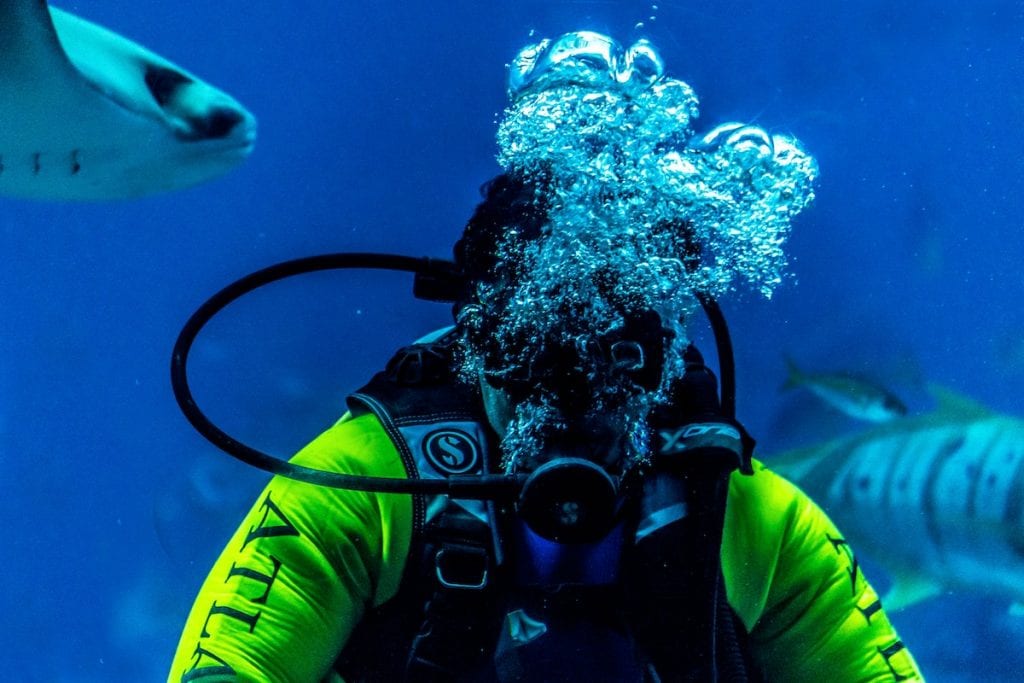 All divers begin getting their qualifications with a beginner’s Open Water course. It teaches novice divers some basic information and techniques, providing you with just the essentials to get you started. It’s great for learning how to use your scuba equipment and gives you the chance to practice your skills in a low-key setting. Once you learn the basics, it’ll only be a matter of time before you get the urge to do more challenging dives. The advanced scuba certification gives you the opportunity to go on more difficult dives by enhancing your skills and helps you feel more confident as a diver.
All divers begin getting their qualifications with a beginner’s Open Water course. It teaches novice divers some basic information and techniques, providing you with just the essentials to get you started. It’s great for learning how to use your scuba equipment and gives you the chance to practice your skills in a low-key setting. Once you learn the basics, it’ll only be a matter of time before you get the urge to do more challenging dives. The advanced scuba certification gives you the opportunity to go on more difficult dives by enhancing your skills and helps you feel more confident as a diver.
With the advanced scuba certificate, you’ll be able to dive deeper into underwater territory you’ve not yet experienced. And, if you plan to dive professionally, then this course is a must. It’s clear there are many advantages to getting your advanced diving certification and John is happy to help you get there. As a certified Master Scuba Diver Trainer, he can help you complete your certification, providing you with quality and valuable information and training along the way.
The advanced diver certification gives divers greater opportunities when it comes to underwater excursions. The certificate can be obtained through an Advanced Open Water course taught by a certified dive professional. During the course, your dive instructor will give you in-depth knowledge about diving practices, equipment, and safety which you’ll then use on your guided adventure dives.
The advanced diver's course is designed to give divers more experience so that they feel more confident and become self-sufficient in the water in different scenarios and conditions than their open water course. With the help of your instructor, you’ll develop new skills to expand your diving opportunities and experience more of the underwater world.
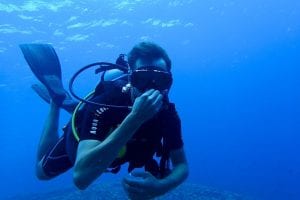 What are the advantages of having the Advanced Scuba Diver Certification?
What are the advantages of having the Advanced Scuba Diver Certification?There are several advantages to getting your advanced diver certification from gaining more experience to becoming a dive professional. Not only does the advanced diver certification give you comprehensive information about diving, but without the certification, the types of dives you’re able to participate in are more limited. So, along with being a great way to continue your education, the advanced diver certification can help you continue to experience more and go on greater underwater adventures. See how an advanced diver course can help you grow as a diver!
The advanced diver course takes students on 5 adventure dives which help divers get to feel more confident and natural when they dive. Through specialty training with your instructor, you’ll learn new dive skills such as buoyancy control and navigating underwater. During these adventure dives, you’ll practice new diving techniques and familiarize yourself with new dive specialties.
There are many levels and types of diving which can be mastered over time. The advanced diver certification is the first step in continuing your dive education. It’ll open doors to new diving opportunities that otherwise aren’t possible.
Another advantage of obtaining your advanced diving certification is it allows you to pursue diving professionally. Without this certification, you won’t be able to move up in the diving community which limits the dives you can participate in and keeps you from improving your skills. If you love diving as much as our instructor John, then you’ll definitely want to get certified so you can become an expert diver, too.
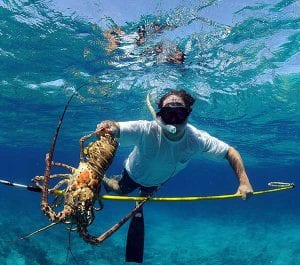 Get Certified with Dreaming Sea Divers
Get Certified with Dreaming Sea DiversInterested in expanding your dive abilities? Then connect with John at Dreaming Sea Divers today to get your advanced scuba diver certification! As a certified PADI, SDI, and SSI Instructor with thousands of recorded dives under his belt, John is beyond passionate about helping others develop and embrace their love for diving. He emphasizes the importance of safety in his courses and is always willing to help a diver improve their skills. See how John can help you become a better diver today!
With the modern invention of the SCUBA tank, exploration of the oceans has been changed dramatically, but still, people continue to free dive. Ancient people all around the world have been exploring the oceans for centuries without an air cylinder.
However, in the debate of SCUBA diving vs. freediving, the differences go deeper than just the equipment. While both are a similar adventure, the technique and overall experience between the two is vastly different, and each person has a particular perception of the dive. It is truly a matter of taste.
The most obvious difference between SCUBA diving vs. freediving is the use of an air tank and other relatively cumbersome equipment like masks, gloves, regulators, depth gauges, and in today’s age, a dive computer. In contrast, while you really don’t need anything to go free diving, the most basic equipment includes a mask and fins. It’s also common to wear a wetsuit and a snorkel depending on your objective. With freediving, the most important thing you dive with is your dive buddy.
When people started using tanks to explore oceans the technique had to evolve with the technology. SCUBA divers must pay careful attention to their ascents, descents and take routine safety stops to avoid decompression sickness. They have to be aware of the nitrogen levels in their bodies. This makes SCUBA diving a slower, more thought out adventure than freediving.
On the other hand, freedivers don’t have to worry about nitrogen levels or slow ascents and descents. Freedivers have much more maneuverability than SCUBA divers. However, freedivers are challenged to hold their breath throughout the entire dive. Freediving requires a great deal of practice and training to be able to stay down for an extended period of time.
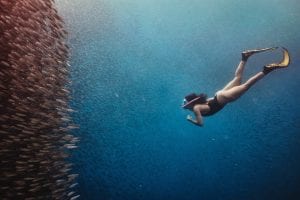
While the differences in gear affect the technique, the technique affects the experience. So if you’re SCUBA diving, you will have the advantage of staying underwater for longer. The longer you stay down, the more time you have to observe marine life and underwater geographical features. This means the longer you stay underwater, the more your eyes will adjust to the dark lighting which can increase the vibrancy creating a totally different image than a freediver. The length of time also influences how much you can explore. For example, if you’re going down to an underwater shipwreck or canyon you will be able to explore it more thoroughly.
However, freediving also has its benefits. Without the need for a tank, a freediver is able to swim smoother through the water and have a different experience with marine life. There is no added noise or disturbance because you are simply holding your breath. This can allow a freediver to get up close to schools of fish or turtles without scaring them off.
It has also been pointed out by avid ocean explorers that one of the biggest differences between SCUBA diving vs. freediving is the sense of awareness. When you are SCUBA diving you are enabled to mainly focus externally on your surroundings and gear. You are constantly analyzing these things and reacting to external forces underwater.
In freediving, it has been described as a more inward-focused experience where you are challenging yourself while still exploring. Your perception of yourself and your surroundings are altered when your mind is in a survival state, and you have to pay careful attention to what your body is telling you.
While the debate of SCUBA diving vs. freediving can go on forever, Dreaming Sea Divers has the best of both worlds. Here at Dreaming Sea Divers, we offer classes and guided experiences for both types of diving. If you have any questions or want to learn more about us, head over to our contact page or give us a call at (607) 624-6770.
SCUBA diving is a sport that many people have heard about, whether it was in movies or on television, in the news, or in books they had read. Some take an immediate interest in it and some stay on the sidelines and don’t really revisit the topic. The training agencies are all standardized so that we all teach the same curriculum across the different agencies with very little variation. But unless you’re learning from a certified diver who’s absorbed the material well, you may have been misinformed about what exactly SCUBA Diving involves. Here’s a list of some of these misconceptions!
Even some of my favorite TV shows (i.e. Money Heist, Season 3) get this wrong and it’s frustrating because it comes off as lazy to assume this is true and not do five minutes of research. Recreational (non-commercial or no decompression divers) do not use pure oxygen while diving. What we use at the entry-level is what we refer to as “Air”. It is comprised of the same mixture of Oxygen (~21%) and Nitrogen (~79%) that is in our atmosphere that we take in with every breath here on the surface. In your Open Water Diver Course, you will learn why this is safe. In your Enriched Air Nitrox course, you will learn how to use more than 21% oxygen, but no more than 40% oxygen safely and why divers choose to do so.

Okay, I know I just threw some numbers at you, but there is little math and physics that you need to truly memorize. What you do learn is how pressure affects us and our bodies, about the gas that we breathe, and how pressure increases the deeper we go. We benefit so much from technology in the 21st century in so many facets of our lives and diving is no different. Computers keep track of how deep we are, how long we have been down, and where our limits are in depth and time. This is all calculated in real-time. You need only to understand the concepts of what the computer is doing. Blindly following any computer is unsafe. Once you know the basics of diving physics, you know how to trust your computer.
Why would you run out of air? Air management is a vital and simple skill. The basic rule is: pay attention. This is a very preventable emergency. You learn how to avoid running out of air by monitoring your gas, letting your buddy know how much air you have, and learning when to leave the bottom. Another beautiful thing about technology is that some computers also know how much air you have and can alert you when you get to a preset amount.
In the mid-1900s, Freedivers were defying what so many physicists hypothesized. That is, that the enormous pressure of the ocean would crack a man’s ribcage past a certain point (~100m/333ft). The truth is, our bodies are well prepared to survive incredibly deep dives with the proper training. Pressure affects air spaces and the air spaces we take down with us are our mask, ears, sinuses, and lungs. The ears and the mask are the most noticeably affected by the pressure and in these air spaces. Have you ever tried to dive to the bottom of the pool and experienced discomfort in your ears? Have you ever had sinus or ear discomfort on an airplane? The physics are the same. We simply need to blow out of our nose gently while pinching our nostrils and we do this before we experience discomfort.
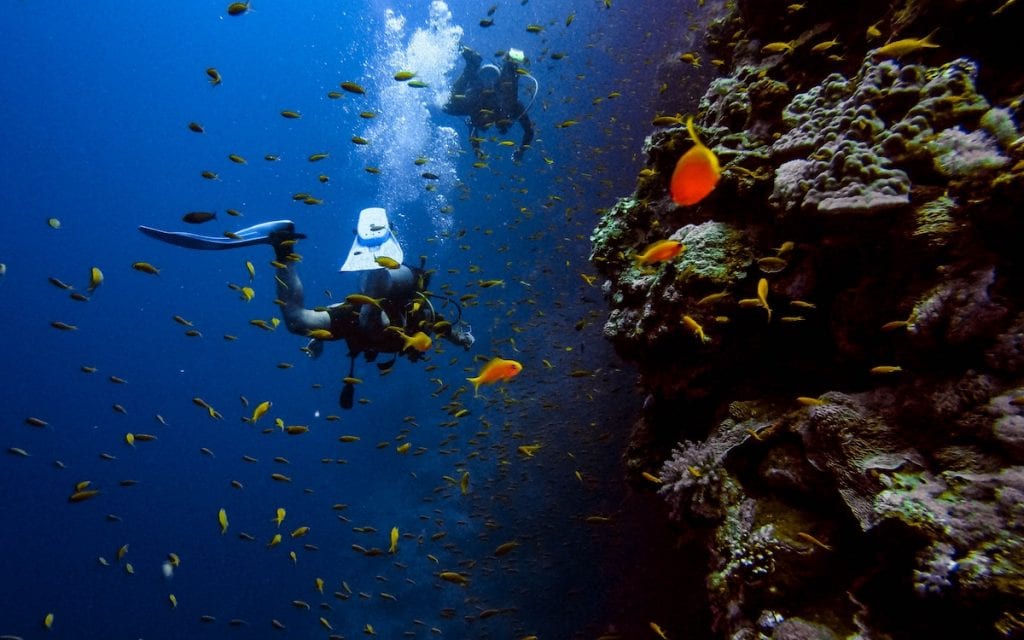
This could turn into a physics lesson but the truth is, I’m not qualified to teach it! Water does absorb light and color, yes. But natural light penetrates the ocean and other bodies of clear water for hundreds of feet. You would bring a light if you wanted to look into crevasses in the coral or perhaps under ledges. We do this especially when we’re hunting for lobsters. Underwater photography also calls for additional light sources sometimes, but not always. In general, you needn’t worry about the darkness of the ocean.
Swimmers who have trained and competed in, say high school or college, do generally make good divers. This, however, is not a prerequisite. Children as early as 8 years old can try SCUBA in a pool and students as young as 10 years old can be Junior Open Water Diver certified to a depth of 40ft. There are also handicap-able SCUBA divers. I once spent two days doing exploration dives with a 17-year young woman who was only able to use one leg. Divers come in many forms and the sport does not disclude people who don’t regularly swim laps. While diving, you’re using your legs with the help of fins for propulsion and the way you move through the water on SCUBA is very different than swimming laps.
The truth is, we’re going into the sharks' house and we’re so lucky when we get to see sharks in the wild. We’re wearing a SCUBA unit that makes us sound like Darth Vader when we breathe. We also blow bubbles while we breathe. Sharks are not used to hearing Darth Vader and they’re not used to seeing bubbles in the water so our breathing generally scares them away. If we don’t bring dead fish with us in the water or shoot a fish while we’re there, sharks stay at a very safe distance from us and sadly don’t normally come close enough for a great photo. It’s rare moments when we get a good shot and a closer interaction but I’ve spent years diving with sharks and have never seen them be aggressive towards divers. I’ve never been bothered by barracudas either.
The founder of Dreaming Sea Divers (DSD), John, knew he was ready to branch out and start his own company, and start training people the way he has seen his students learn the best. That is, at their pace, in an unintimidating environment, in a private SCUBA class with their instructor, who is there every step of the way. This personal and private approach separates him from the rest by eliminating the large groups at a devastating discount with fine print. The positive approach John employs sets him apart from some militant type instructors with scare tactics. John has more tools in his toolbox.
Well, you can’t have a business without a name and Dreaming Sea Divers is personal to John! He’s has had a strong affinity for Dave Matthews Band since high school, referring to them as his “desert island band”. Of their vast catalog of songs, John chose a song that he could relate to the ocean, “The Dreaming Tree.” This song is about an old man reminiscing of a tree he used to sit under and think. He used to climb it with a girl that he shared his first kiss with. Sadly, the tree dies because of the progress of the world. Coral bleaching and plastic ending up in the ocean is perhaps a topic for a different blog but the similarities between a tree dying and the ocean needing advocates were obvious to John.
As we said before, Dave Matthew Band has a huge catalog of original songs and performs dozens of covers live. They’ve never played the same show twice, each song is different from night-to-night.
Diving is just like this! No two dives are the same. You never know what you'll see, who you may end up diving with, or where your diving endeavors may take you! John has a huge place in his heart for music, diving, and education. He loves learning new music as much as he loves learning and spreading his knowledge and skills of diving.